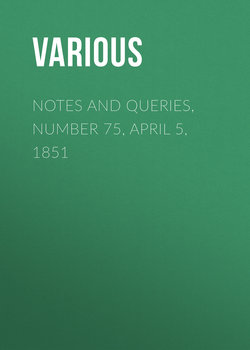Notes and Queries, Number 75, April 5, 1851

Реклама. ООО «ЛитРес», ИНН: 7719571260.
Оглавление
Various. Notes and Queries, Number 75, April 5, 1851
Notes
TWO CHANCELLORS
ILLUSTRATIONS OF CHAUCER, NO. III
FOLK LORE
THE THRENODIA CAROLINA OF SIR THO. HERBERT
Minor Notes
Queries
POEMS OF JOHN SEGUARD OF NORWICH
EPITAPH ON THE COUNTESS OF PEMBROKE
Minor Queries
Minor Queries Answered
Replies
BARONS OF HUGH LUPUS
EDMUND PRIDEAUX AND THE FIRST POST-OFFICE
LADY JANE OF WESTMORELAND
Replies to Minor Queries
Miscellaneous
NOTES ON BOOKS, SALES, CATALOGUES, ETC
BOOKS AND ODD VOLUMES WANTED TO PURCHASE
Notices to Correspondents
NATIONAL ILLUSTRATED LIBRARY,
NEW BOOKS AND NEW EDITIONS
BRITISH CONTROVERSIALIST
Отрывок из книги
Although neither your readers nor I are politicians enough to interfere in the changes proposed with reference to the office of Lord Chancellor, I doubt not that some of them, now the subject is on the tapis, may feel interested in a fact connected with it, which our ancient records disclose: namely, that on one occasion there were two chancellors acting at the same time for several months together, and both regularly appointed by the king.
It is an unique instance, occurring in the reign of Edward IV.: the two chancellors being Thomas Rotheram, Bishop of Lincoln, and John Alcock, Bishop of Rochester. The former received the Great Seal in May, 1474, in the fourteenth year of the reign, and without any doubt continued chancellor till the king's death; and yet, from April to September in the following year, the latter was also addressed by the same title. During that interval of five months, there are numerous writs of Privy Seal addressed by the king to both, in which each of them is styled "our chancellor."
.....
When Venus first enters Mercury's "palais," she "ne found ne sey no maner wight." This signifies the absence from home of Cyllenius, who was abroad upon "his chirachee" in attendance upon the Sun; and here again is an instance of the nice astronomical accuracy of Chaucer. It was impossible that the planet Mercury could be in the sign Gemini, because his greatest elongation, or apparent distance from the sun, does not exceed 29 degrees; so that the Sun having but just entered Taurus, Mercury could not be in Gemini. Neither could Venus see Valens (the other impersonation of Mercury), because of his concealment in the cave; but when she entered the cave, then she was welcomed and received by him.
Now, to render the text conformable with this interpretation, some alteration in the construction is necessary, as indeed it must be in any attempt to render the passage intelligible.
.....